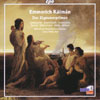Kálmán (Der) Zigeunerprimas
A richly melodic operetta well sung, even if a little short on Viennese verve
View record and artist detailsRecord and Artist Details
Composer or Director: Imre (Emmerich) Kálmán
Genre:
Opera
Label: CPO
Magazine Review Date: 1/2006
Media Format: CD or Download
Media Runtime: 101
Mastering:
Stereo
DDD
Catalogue Number: CPO777 058-2

Tracks:
| Composition | Artist Credit |
|---|---|
| (Der) Zigeunerprimas, 'Sari' |
Imre (Emmerich) Kálmán, Composer
Claus Peter Flor, Conductor Edith Lienbacher, Juliska, Soprano Gabriele Rossmanith, Sári, Soprano Imre (Emmerich) Kálmán, Composer Kay Stiefermann, Graf Estragon, Baritone Munich Philharmonic Choir Munich Radio Orchestra Roberto Saccà, Laczi, Tenor Wolfgang Bankl, Pali Rácz, Zigeunprimas, Bass Zoran Todorovich, Gaston, Tenor |
Author: Andrew Lamb
Kálmán’s Der Zigeunerprimas (‘The Gypsy Virtuoso’) does not boast quite the same remarkable sequence of hit numbers as Die Csárdásfürstin (‘The Gypsy Princess’), recently recorded by Naxos (3/05). But what operetta could? By any normal standard it is a richly melodic score, and Kálmán’s typical fusion of racy Hungarian rhythms and spicy orchestration with languid, melancholic waltzes is particularly appropriate for a work rooted in Hungarian popular music history.
The work dates from just slightly earlier in Kálmán’s output than The Gypsy Princess and, though it bypassed Britain, it was a particularly big hit in America, where it was renamed Sári after its female lead. While Lehár later composed an operetta around the classical virtuoso Paganini, Kálmán beat him to it with his tale of a real-life gypsy violinist Pali Rácz (1830-86), reluctant to accept that his time is past and that his son’s more modern style and taste for more serious composers is the flavour of the day. The operetta’s joyous waltz melodies, which include Pali Rácz’s soliloquy to his violin, ‘Mein alter Stradivari’, will already be widely familiar from the popular waltz Dorfkinder; but there are many other winning numbers, including a delightful song for Sári with children’s chorus (the real-life Pali Rácz had 36 offspring) and the lively dance number ‘Hazazaa’ that Kálmán added for the Budapest production. There’s a typically imaginatively and expertly constructed Act 1 finale that weaves solo violin and cimbalom into vocal reminiscences.
Curiously, though an infrequently heard operetta, two other versions have recently become available – a 1949 Hamburg radio version with Josef Metternich on Gala and a 2002 English-language recording by Ohio Light Opera on Albany. The present recording is of a concert performance in Munich in October 2003, complete with audience reaction and narrator. That’s a less than ideal arrangement, and compared with the 1949 recording, Claus Peter Flor’s conducting wins on grace and charm but misses out on Viennese verve. Nor do I find Wolfgang Bankl’s young and somewhat constricted bass ideal for a role that really needs a mature character singer. On the other hand, Edith Lienbacher and Roberto Saccà make a good secondary couple, and Gabriele Rossmanith is a special delight as Sári opposite Zoran Todorovich, whom I admired in Naïve’s recent Zigeunerbaron (5/05) as I do here. Even with its shortcomings, this is not to be missed by those who appreciate Kálmán’s highly perfumed confections.
The work dates from just slightly earlier in Kálmán’s output than The Gypsy Princess and, though it bypassed Britain, it was a particularly big hit in America, where it was renamed Sári after its female lead. While Lehár later composed an operetta around the classical virtuoso Paganini, Kálmán beat him to it with his tale of a real-life gypsy violinist Pali Rácz (1830-86), reluctant to accept that his time is past and that his son’s more modern style and taste for more serious composers is the flavour of the day. The operetta’s joyous waltz melodies, which include Pali Rácz’s soliloquy to his violin, ‘Mein alter Stradivari’, will already be widely familiar from the popular waltz Dorfkinder; but there are many other winning numbers, including a delightful song for Sári with children’s chorus (the real-life Pali Rácz had 36 offspring) and the lively dance number ‘Hazazaa’ that Kálmán added for the Budapest production. There’s a typically imaginatively and expertly constructed Act 1 finale that weaves solo violin and cimbalom into vocal reminiscences.
Curiously, though an infrequently heard operetta, two other versions have recently become available – a 1949 Hamburg radio version with Josef Metternich on Gala and a 2002 English-language recording by Ohio Light Opera on Albany. The present recording is of a concert performance in Munich in October 2003, complete with audience reaction and narrator. That’s a less than ideal arrangement, and compared with the 1949 recording, Claus Peter Flor’s conducting wins on grace and charm but misses out on Viennese verve. Nor do I find Wolfgang Bankl’s young and somewhat constricted bass ideal for a role that really needs a mature character singer. On the other hand, Edith Lienbacher and Roberto Saccà make a good secondary couple, and Gabriele Rossmanith is a special delight as Sári opposite Zoran Todorovich, whom I admired in Naïve’s recent Zigeunerbaron (5/05) as I do here. Even with its shortcomings, this is not to be missed by those who appreciate Kálmán’s highly perfumed confections.
Explore the world’s largest classical music catalogue on Apple Music Classical.
Included with an Apple Music subscription. Download now.

Gramophone Digital Club
- Digital Edition
- Digital Archive
- Reviews Database
- Events & Offers
From £9.20 / month
Subscribe
Gramophone Club
- Print Edition
- Digital Edition
- Digital Archive
- Reviews Database
- Events & Offers
From £11.45 / month
Subscribe
If you are a library, university or other organisation that would be interested in an institutional subscription to Gramophone please click here for further information.






